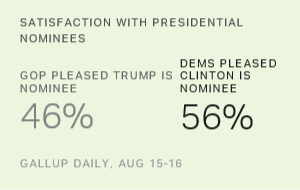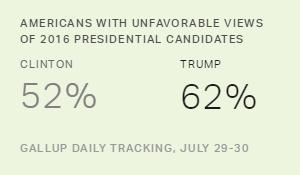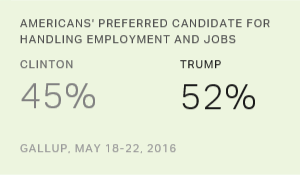Both Donald Trump and Hillary Clinton delivered major economic speeches within the last several weeks. spoke in Detroit and in Warren, Michigan, just outside of the Motor City.
Reading through the two candidates' speeches, it's immediately apparent that, as befits a political campaign, both candidates make it sound like their opposing candidate's economic vision is, or would be, the worst thing to hit the nation since the Great Depression.
Trump, speaking in his usual understated way, said, "Every policy that has failed this city [Detroit] and so many others is a policy supported by Hillary Clinton," and, "The one common feature of every Hillary Clinton idea is it punishes you for working and doing business in the United States."
Clinton in her speech said, "He [Trump] hasn't offered any credible solutions for the very real economic challenges we face," and, "Even conservative experts say Trump's agenda will pull our economy back into recession."
This rhetoric certainly makes it sound like there would be zero areas of commonality between the two candidates on economic issues. This is, in fact, not the case. The two candidates actually share some ideas in common, and also in common with the average American.
For example, both candidates agree strongly on the need to create more jobs in the U.S. Trump said he will: "Increase GDP by more than $100 billion annually, add over 500,000 new jobs annually," while Clinton said, "With our plans, the economy would create more than 10 million new jobs," and, "Starting on Day One, we will work with both parties to pass the biggest investment in new, good-paying jobs since World War II."
As I've examined , this focus on jobs fits very well with a good deal of research showing how central jobs are to the American public's view of what's needed to help the economy. Of course, Trump and Clinton differ on how they are going to create 500,000 or 10 million new jobs, but the idea of holding this as an economic objective is a powerfully positive one as far as the average American is concerned.
Both candidates also agree on the need to spend more on infrastructure, an additional point on which the American public strongly agrees.
Trump said, "We can use this new wealth to rebuild our military and our infrastructure," while Clinton said, "Creating an infrastructure bank to get private funds off the sidelines and complement our private investments. Twenty-five billion dollars in government seed funding could unlock more than $250 billion and really get our country moving on our infrastructure plans."
Three-quarters of Americans with a proposal to "spend more federal money to improve infrastructure, including roads, buildings and waterways," one of the higher levels of agreement with any policy proposal found in our research.
The two candidates also agree -- in a negative way -- on the future of the Trans-Pacific Partnership (TPP) trade agreement. Trump talked in his speech about not only his opposition to the TPP but also about how Clinton will enact the TPP. But in her speech, Clinton makes it clear that she, in fact, opposes the TPP, just like Trump.
Here's how Trump phrased his feelings about the TPP: "Just imagine how many more automobile jobs will be lost if the TPP is actually approved. That is why I have announced we will withdraw from the deal before that can ever happen." Clinton said, "My message to every worker in Michigan and across America is this: I will stop any trade deal that kills jobs or holds down wages -- including the Trans-Pacific Partnership. I oppose it now; I'll oppose it after the election, and I'll oppose it as president."
This is an instance where Americans, generally, are not in agreement with the position of the two candidates. about ending "U.S. participation in free trade deals, such as NAFTA and the Trans-Pacific Trade Agreement," 28% of Americans agree while 28% disagree -- the rest, over 40%, have no opinion. Other by ║┌┴¤═° shows that Americans view trade as an opportunity rather than a threat.
There are, of course, some issues on which the candidates hold opposing views. For example, what about abolishing the estate tax? Trump favors this action: "No family will have to pay the death tax," and Clinton it -- she wants to raise the estate tax and lower its threshold.
The American public sides more with Trump than Clinton on this issue, with 54% agreeing with the idea to "eliminate the estate tax that is paid when a person dies," and only 19% disagreeing. Further, when the proposal is phrased more like what Clinton would advocate, 33% agree and 43% disagree with the idea to "increase the tax owed when people die with estates valued at over $3.5 million."
On taxes more generally, Trump would enact a major tax reduction, including cuts for the middle class, saying: "I am proposing an across the board income tax reduction, especially for middle-income Americans." Clinton talked in her speech mostly about raising the taxes on the well-to-do, saying: "Wall Street, corporations and the super-rich, should finally pay their fair share of taxes. That's why I support the so-called 'Buffett Rule,' because multi-millionaires should not be able to pay a lower tax rate than their secretaries. We should also add a new tax on multi-millionaires."
Americans, in essence, agree with both candidates. Some 47% of Americans agree (34% disagree) with the proposal to "cut federal income taxes for all income levels," while 45% agree and 38% disagree with the proposal to "raise federal income tax rates on households earning over $250,000 per year." Plus, very specific to Trump's emphasis on tax cuts for middle-class America, 72% agree with the premise to "enact tax cuts for lower- and middle-income families," while just 10% disagree. And very specific to Clinton's emphasis, 63% of Americans agree with "eliminate most federal income tax deductions and loopholes available to the very rich," compared with 17% who disagree. (See as well for review of data showing that Americans strongly support Clinton's concept of more taxes on those who have more.)
Neither candidate can go wrong by talking about lowering middle-class taxes or raising taxes on the rich.
Both candidates in their speeches emphasized particular focus points that are among the most popular of any we have tested with the public -- helping small business and improving veterans' care.
Clinton said, "I will also make a major push to empower small businesses and entrepreneurs, with new national initiatives to cut red tape at every level and expand access to credit, especially through community banks and credit unions," and, "I will propose a new plan to dramatically simplify tax filing for small businesses."
Almost everything we put in front of the average American relating to small business tests well. For example, 77% of Americans agree with the proposal to "lower the tax rate on small businesses"; 73% agree with the proposal to "make government loans available to small businesses"; and 70% agree with the proposal to "create more tax incentives for small businesses and entrepreneurs who start new businesses."
And Trump, for his part, emphasized another very popular focus point -- improving the Veterans Administration. Trump said, "We also have a plan, on our website, for a complete reform of the Veterans Health Administration." The proposal to "allow veterans to get healthcare at any healthcare provider that accepts Medicare, not just Veterans' Administration medical facilities," is the single-highest-testing proposal we have measured, with 91% of Americans agreeing. More generally, 74% of Americans agree with the proposal to "spend federal money to modernize the Veterans Administration."




